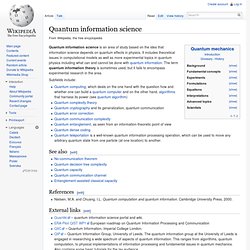

Quantum computation: Michelle Simmons at TEDxSydney. CS294-2, Spring 2007. Re: About Quantum Computing. I didn't read the article from Wilczek (might do that later), but I can tell you this.

Quantum Computing by means of anyons has become quite a growing research area over the past few years. It is usually refered to as Topological Quantum Computation, where the "topological" refers to the fact that one makes use of so-called topological degrees of freedom. These degrees of freedom are of a non-local nature (at least the one that I am familiar with), which is what makes them so appealing for use of quantum computation.
Disturbances coming from heat, photons, phonons and so on are all caused by local interactions, meaning that topological degrees of freedom are unaffected by them.
Home. Logic Studies. Quantum information science. Quantum information science is an area of study based on the idea that information science depends on quantum effects in physics.

It includes theoretical issues in computational models as well as more experimental topics in quantum physics including what can and cannot be done with quantum information. The term quantum information theory is sometimes used, but it fails to encompass experimental research in the area. Subfields include: See also[edit] References[edit] Nielsen, M.A. and Chuang, I.L. Introduction to Quantum Computing. Alan Turing invented the programmable computer in 1936 (see Resources) as a thought experiment to show that certain mathematical problems were not computable.

Implicit in his argument was the idea that a computer, armed with sufficient resources, is capable of realizing any reasonable algorithm. Since that time, the computer industry has not only managed to build programmable computing machines, they've also outdone themselves by doubling the capabilities every eighteen months or so. Despite these frenetic advances in computer technology, modern computers are still unable to make significant dents in hard problems. Problems that require exponential resources (compared to the size of the problem itself), remain as intractable today as they were in 1936. In 1982 Richard Feynman suggested that the venerable Turing machine might not be as powerful as people thought.
Yet somehow, nature is able to simulate this mathematical problem using only N particles. Let's imagine the following problem. Quantum computer. Using quantum-mechanical phenomena for computing The Bloch sphere is a representation of a qubit, the fundamental building block of quantum computers.

Quantum computing is the use of quantum-mechanical phenomena such as superposition and entanglement to perform computation. A quantum computer is used to perform such computation, which can be implemented theoretically or physically.[1]:I-5. Simons Conference on New Trends in Quantum Computation, November 15-18, 2010. First programmable quantum computer created. Home - Ruhr-Universität Bochum. Quantum Computation. SAO/NASA ADS Physics Abstract Service · Electronic Refereed Journal Article (HTML)· References in the article· Citations to the Article (846) (Citation History) · Refereed Citations to the Article· Also-Read Articles (Reads History) · · Translate This Page Abstract If the bits of computers are someday scaled down to the size of individual atoms, quantum mechanical effects may profoundly change the nature of computation itself.

The wave function of such a quantum computer could consist of a superposition of many computations carried out simultaneously; this kind of parallelism could be exploited to make some important computational problems, like the prime factoring of large integers, tractable. Quantum Computation. Quantum Computation. Dreams Versus Reality: Plenary Debate Session on Quantum Computing. Dreams Versus Reality: Plenary Debate Session on Quantum Computing. [quant-ph/0310130] Dreams versus Reality: Plenary Debate Session on Quantum Computing. Quantum Computing research by Mikko Möttönen at Aalto University. Quantum Computing research by Mikko Möttönen at Aalto University. An Introduction to Quantum Computing.
Edward Gerjuoy received his Ph.D. in theoretical physics from the University of California at Berkeley in 1942.

After working on antisubmarine warfare problems during World War II he taught at several academic institutions, winding up at the University of Pittsburgh where he presently is Professor of Physics Emeritus, having been appointed professor in 1964. In 1977 he obtained a law degree, and thereafter for many years shared his time between physics and the law. As a scientist lawyer he has been Editor-in-Chief (1981-1986) of the American Bar Association (ABA) Journal of Law, Science and Technology.
During his entire career, however, he also has devoted considerable time to the defense of human rights. His quantum computing/information publications include: “Deterministic Dense Coding and Entanglement Entropy” (with P.S. Researchers should cite this work as follows: QUANTWARE MIPS CENTER. David Deutsch Video Lectures. Quantum computing for the determined. Quantum computing for the determined.